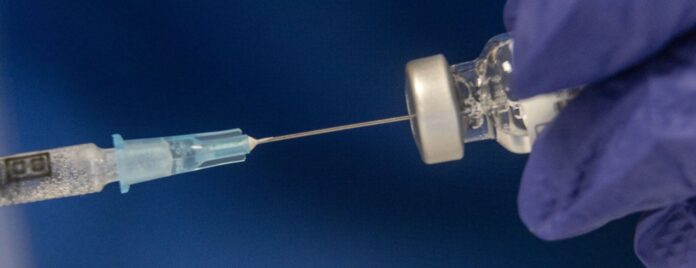The Biden administration’s implementation of the Medicare drug pricing program could alter drugmaker strategy on biosimilars, highlighted by the recent approval of a follow-on biologic to a Johnson & Johnson drug tapped for negotiations.
The FDA’s approval last month of Amgen’s Wezlana as an interchangeable biosimilar to Johnson & Johnson’s Stelara raised the possibility that the drug to treat multiple inflammatory diseases could be pulled from the price negotiation program put in place by the 2022 Inflation Reduction Act.
Stelara is the first instance of a drug on the price negotiation list with an approved biosimilar expected to hit the market, but it’s unlikely to be the last. Other biologics on the list such as Amgen’s Enbrel, used to treat rheumatoid arthritis, and Novo Nordisk’s NovoLog and Fiasp insulins are expected to have a biosimilar enter soon as well.
Prior to the the Centers for Medicare & Medicaid Services’ selection of drugs for price cuts, drugmakers were already uncertain about future entry for biosimilars due to the provisions the program imposed. The potential value of a biosimilar entering the market may be eroded if Medicare can significantly lower the price of a biologic.
Amgen’s Wezlana is a test case for this “widely held premise,” said Connie Wilkinson, an attorney at Epstein Becker Green and member of its board of directors.
“The erosion of the value proposition may impact not only this biosimilar but others, which could result in them being withdrawn from the market or never launching,” Wilkinson said. “These dynamics are expected to significantly undercut incentives for developing biosimilars with high utilization in the Medicare market.”
Biologic and biosimilar drugmakers may be at odds with Medicare’s program guidance in the next few years as the industry observes Wezlana’s come-to-market amid litigation seeking to halt the program’s implementation. The Inflation Reduction Act’s goal is to increase access to and utilization of biosimilars, along with promoting competition in the marketplace, but the effect of some provisions of the law may result in the opposite.
“There is not a clear picture as to the full impact the IRA will have on biosimilars, but many in the industry believe that its provisions will directly prevent the outcome for which the IRA was enacted,” said Natalie Oehlers, an associate at Buchanan Ingersoll Rooney.
Open or Closed Doors
Under the law, biosimilars are affected in three key ways: a temporary payment increase for qualifying biosimilars under Medicare Part B; Part D reforms and rebates; and the drug price negotiation program. The law allows biologics to be negotiated 11 years after the Food and Drug Administration’s approval, unless a biosimilar competitor is available and marketed.
But drugmakers question how far that competition will go in the price setting provisions.
“This provision itself has caused a lot of contention in the industry as price setting could make biosimilar entry difficult,” Oehlers said.
“The setting of a maximum drug price could make the recoupment of large investments required to make a biosimilar difficult to obtain. This in turn may disincentivize manufacturers from developing biosimilars and inhibit innovation,” she said.
If the CMS is successful in negotiating a significantly lower maximum fair price for Stelara, “it would exacerbate for Wezlana the market access issues biosimilars already face, given that a less expensive reference product makes a biosimilar look less favorable to purchasers,” Wilkinson sad.
Future Entry
Nine pending lawsuits against the program include arguments from drugmakers questioning what constitutes “bona fide” and “meaningful” competition. Drugs can be pulled or not selected for the program, or not have the maximum fair price be applied, if there is meaningful competition, according to the agency.
The CMS would have to determine before Aug. 1, 2024, when the first negotiation period ends, that there is meaningful competition for the drug, which could block the maximum fair price from being applied.
The agency has made clear it will conduct ongoing assessments to determine if meaningful competition exists.
AbbVie’s Humira, one of the top-selling pharmaceuticals in the world, could have been selected for price negotiation due to these competition definitions, since the drug is included in Medicare’s Part D category with a high reimbursement. But the drug, a treatment for rheumatoid arthritis and other inflammatory diseases, ultimately wasn’t selected because of its biosimilars.
For future negotiation cycles, biosimilar manufacturers may have other alternatives if they can successfully determine the likelihood that a given drug may be selected. The law permits a biosimilar manufacturer to request a delay in negotiation of the reference product if its biosimilar is expected to come to market within two years.
“Biosimilar manufacturers should prioritize planning now to ensure they understand the law’s provisions and how it will affect their portfolio,” said Brian Biehn, senior director of biosimilar commercialization at Cencora, the global pharmaceutical solutions provider formerly known as AmerisourceBergen.
“The planning will better position the company to anticipate potential challenges, address critical questions and make more informed decisions,” Biehn said.
